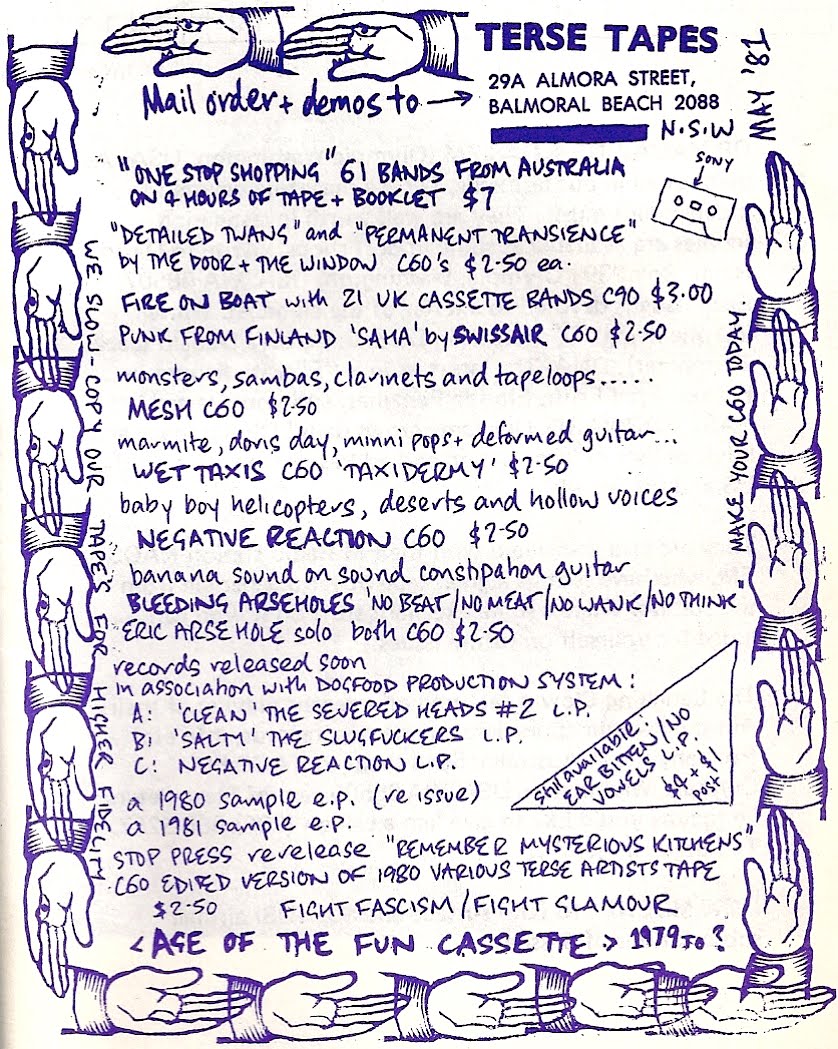|
CASSETTE REVOLUTION, from Rolling Stone, 1982
Attitudes to cassettes are changing,” says Andy Maine, co-producer of Fast Forward cassette magazine. “For so long they’ve been the little brother or sister of records, whereas now they’re coming into their own. Things are being done with cassettes that can’t be done with records.” Australia has always been slow to recognize its own achievements. What with the ever-increasing popularity of “walky” cassette players, and, in England, Bow Wow Wow’s “C30 C60 C90 Go!” campaign, Island’s “1+1” series and recordings for cassettes only such as the NME/Rough Trade C81, From Brussels with Love and the British Electric Foundation’s Music for Stowaways, there would certainly seem to be some sort of cassette revolution, and within this development, Australia is something of an innovator. Nearly four years ago, Dave Warner made his first impression on the Eastern states with live cassettes.Other bands from Perth, the Mannikins, followed with their Live Locally set, and the Triffids have released a slew. Now, Australia can boast Fast Forward (perhaps a first, being a regular cassette-magazine), and a plethora of cassette concerns. Terse Tapes of Sydney is probably the most prominent of these, and certainly the most active. Run by one man, Tom Ellard, Terse has just released a triple-cassette (“five album equivalent”) called One Stop Shopping, which is a compilation of lots of Australia’s practitioners of Music For Cassettes, “a festival of quasi-normality,” as Ellard puts it. Ellard specifically asked me to review One Stop Shopping with the following provisos: to avoid mentioning “trends in England (unavoidable, sorry, we are all susceptible to them), metaphysics and what Philip Brophy thinks. Just tell them what they get for their sixpence.” Well then, for seven dollars, you get sixty bands — count ‘em, sixty! — too numerous to mention individually, from sources such as the Clifton Hill Community Music Centre (the home of new music in Melbourne), Slow Drama Music (that of the Primitive Calculators’ attendant “little bands”), Painkiller Tapes, M Squared (Scattered Order, Systematics), Tapeworms (Slugfuckers, Bleeding Arseholes), Two Tapes (the N-Lets), Adhesive Records (Laughing Hands), Terminal Records (the Sunday Painters, from Wollongong) and the post-Voigt/465 push (led by Wild West and PeI Mel) as well as Terse itself (Severed Heads, Mindless Delta Children, Agent Orange, Wet Taxis, Mesh); some of these bands play on the rock circuit, most don’t; some have records out, others don’t; and in Ellard’s words “no band was rejected because of style or recording quality.” As a result One Stop Shopping is inevitably a mixed bag. What it really reminds me of in a way is Zappa’s Weasels Ripped My Flesh (and that’s meant to be a compliment). Naturally, it’s impossible to label the music in any single way, but it is fair to say it’s most commonly characterized by “low-tech” sound and instrumentation, equal parts electronic and acoustic, an amateurism bordering on naivety and occasionally pretension, spontaneity, vigour and (often black) humour. It’s a sort of primitivism, and sound collage is popular. As to whether or not it’s experimental, I daren’t say, but it’s nothing like anything you hear on radio. This is music in the league of — and here come some Easy Reference Points — Cabaret Voltaire, the San Francisco of Ralph Records and Chrome, Industrial Records, Factory Records, David (Flying Lizard) Cunningham’s various projects, and the Fall. And it stands up. One Stop Shopping is one moment hackneyed and dull, the next inventive and exciting; but that’s forgivable considering the breadth it presents. Ultimately, perhaps the best thing to say is to echo the sentiments expressed on the cover of the accompanying booklet: “1. Convince some friends to record on a cassette.” |

